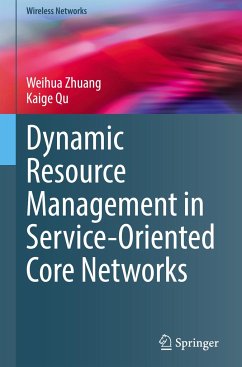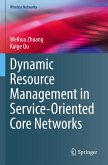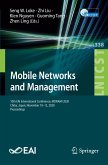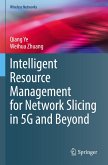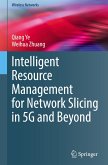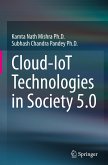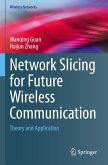This book provides a timely and comprehensive study of dynamic resource management for network slicing in service-oriented fifth-generation (5G) and beyond core networks. This includes the perspective of developing efficient computation resource provisioning and scheduling solutions to guarantee consistent service performance in terms of end-to-end (E2E) data delivery delay.
Network slicing is enabled by the software defined networking (SDN) and network function virtualization (NFV) paradigms. For a network slice with a target traffic load, the E2E service delivery is enabled by virtual network function (VNF) placement and traffic routing with static resource allocations. When data traffic enters the network, the traffic load is dynamic and can deviate from the target value, potentially leading to QoS performance degradation and network congestion. Data traffic has dynamics in different time granularities. For example, the traffic statistics (e.g., mean and variance) can be non-stationary and experience significant changes in a coarse time granularity, which are usually predictable. Within a long time duration with stationary traffic statistics, there are traffic dynamics in small timescales, which are usually highly bursty and unpredictable. To provide continuous QoS performance guarantee and ensure efficient and fair operation of the network slices over time, it is essential to develop dynamic resource management schemes for the embedded services in the presence of traffic dynamics during virtual network operation. Queueing theory is used in system modeling, and different techniques including optimization and machine learning are applied to solving the dynamic resource management problems.
Based on a simplified M/M/1 queueing model with Poisson traffic arrivals, an optimization model for flow migration is presented to accommodate the large-timescale changes in the average traffic rates with average E2E delay guarantee, while addressing a trade-off between load balancing and flow migration overhead. To overcome the limitations of Poisson traffic model, the authors present a machine learning approach for dynamic VNF resource scaling and migration. The new solution captures the inherent traffic patterns in a real-world traffic trace with non-stationary traffic statistics in large timescale, predicts resource demands for VNF resource scaling, and triggers adaptive VNF migration decision making, to achieve load balancing, migration cost reduction, and resource overloading penalty suppression in the long run. Both supervised and unsupervised machine learning tools are investigated for dynamic resource management. To accommodate the traffic dynamics in small time granularities, the authors present a dynamic VNF scheduling scheme to coordinate the scheduling among VNFs of multiple services, which achieves network utility maximization with delay guarantee for each service. Researchers and graduate students working in the areas of electrical engineering, computing engineering and computer science will find this book useful as a reference or secondary text. Professionals in industry seeking solutions to dynamic resource management for 5G and beyond networks will also want to purchase this book.
Network slicing is enabled by the software defined networking (SDN) and network function virtualization (NFV) paradigms. For a network slice with a target traffic load, the E2E service delivery is enabled by virtual network function (VNF) placement and traffic routing with static resource allocations. When data traffic enters the network, the traffic load is dynamic and can deviate from the target value, potentially leading to QoS performance degradation and network congestion. Data traffic has dynamics in different time granularities. For example, the traffic statistics (e.g., mean and variance) can be non-stationary and experience significant changes in a coarse time granularity, which are usually predictable. Within a long time duration with stationary traffic statistics, there are traffic dynamics in small timescales, which are usually highly bursty and unpredictable. To provide continuous QoS performance guarantee and ensure efficient and fair operation of the network slices over time, it is essential to develop dynamic resource management schemes for the embedded services in the presence of traffic dynamics during virtual network operation. Queueing theory is used in system modeling, and different techniques including optimization and machine learning are applied to solving the dynamic resource management problems.
Based on a simplified M/M/1 queueing model with Poisson traffic arrivals, an optimization model for flow migration is presented to accommodate the large-timescale changes in the average traffic rates with average E2E delay guarantee, while addressing a trade-off between load balancing and flow migration overhead. To overcome the limitations of Poisson traffic model, the authors present a machine learning approach for dynamic VNF resource scaling and migration. The new solution captures the inherent traffic patterns in a real-world traffic trace with non-stationary traffic statistics in large timescale, predicts resource demands for VNF resource scaling, and triggers adaptive VNF migration decision making, to achieve load balancing, migration cost reduction, and resource overloading penalty suppression in the long run. Both supervised and unsupervised machine learning tools are investigated for dynamic resource management. To accommodate the traffic dynamics in small time granularities, the authors present a dynamic VNF scheduling scheme to coordinate the scheduling among VNFs of multiple services, which achieves network utility maximization with delay guarantee for each service. Researchers and graduate students working in the areas of electrical engineering, computing engineering and computer science will find this book useful as a reference or secondary text. Professionals in industry seeking solutions to dynamic resource management for 5G and beyond networks will also want to purchase this book.

